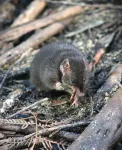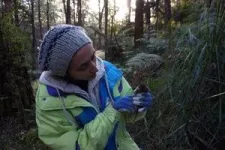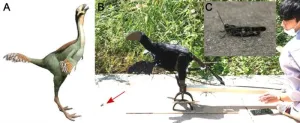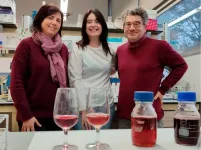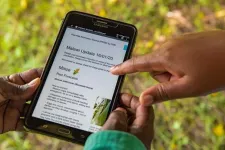(Press-News.org) All animals need sleep. When humans or animals don’t get enough, it can lead to trouble paying attention, irritability, and other ill effects. And yet, researchers reporting in the journal Current Biology on January 25 have made the surprising discovery that a small Australian marsupial called an antechinus will sacrifice hours of sleep per night to make more time for sex during the mating season.
The researchers say the multi-year study is the first to show direct evidence for this type of sleep restriction in any land-dwelling mammal. It’s a trade-off between sleep and reproduction that they say is likely driven by strong sexual selection.
“Using a combination of techniques, we showed that males lose sleep during the breeding season, with one male halving his sleep during this mating period,” says Erika Zaid (@zaid_erika) of La Trobe University in Melbourne, Australia. “In humans and other animals, restricting the normal amount of sleep leads to worse performance while awake, an effect that compounds night after night. And yet, the antechinus did just that: they slept 3 hours less per night, every night, for 3 weeks.”
Antechinus are bizarre in other ways, too. Males only reproduce once in their lifetime and live for only 1 year. Females can live for 2 years. Male antechinus typically die at the same time right after their sole short and intense mating season. During the breeding season, males compete physically and through sperm competition for access to as many females as possible to maximize their reproductive success. Their unusual life history is what drew the researchers led by John Lesku, also of La Trobe University, to study them.
“The males have one shot at fathering offspring during a single 3-week mating period,” Lesku says. “We found that male, but not female, dusky antechinuses, become restless during their only breeding season.”
The researchers used accelerometry to track the marsupials’ movements. They also used electrophysiology and metabolic measures to quantify how much the animals were sleeping. Those data showed that the males were sleeping 3 hours less every night for weeks.
The findings suggest that antechinus may have some way to thrive on less sleep during this time. The other possibility is that they accept the downsides of staying awake to improve their chances at paternity.
“It is actually a little surprising that these animals do not sacrifice even more sleep during the breeding season, since they will soon die anyways,” Zaid says. “In this way, keeping much of their sleep intact reveals the essential functions that sleep serves.”
It’s not clear what causes males to die after the breeding season. The researchers don’t suspect that sleep loss alone is the reason. In part that’s because the males they saw sleeping the least were not the ones in the worst condition.
The researchers want to learn more about how antechinus manage the sleep loss, which is at a level that would make people act as though they were legally intoxicated. “Are antechinus equally compromised, but just get on with it?” they ask. “Or are they resilient to the negative effects of sleep restriction?” These are exciting questions for future study.
######
This research was funded by the Australian Research Council, the Groningen Institute for Evolutionary Life Sciences, and the La Trobe University Department of Environment, Ecology and Evolution.
Current Biology, Zaid et al.: “Semelparous marsupials reduce sleep for sex.” https://www.cell.com/current-biology/fulltext/S0960-9822(23)01764-5
Current Biology (@CurrentBiology), published by Cell Press, is a bimonthly journal that features papers across all areas of biology. Current Biology strives to foster communication across fields of biology, both by publishing important findings of general interest and through highly accessible front matter for non-specialists. Visit http://www.cell.com/current-biology. To receive Cell Press media alerts, contact press@cell.com.
END
What are the origins of wings and tails in birds? This is one of the key questions in the evolution of animals. It has long been accepted that their evolution began in feathered dinosaurs. Some of these dinosaurs had feathers on the tails and small wing-like feathers on their forelimbs (arms). These small wing-like structures called ‘proto-wings’ are composed of special feathers known as pennaceous feathers — the stiff feathers found in the wings and tails of birds. The ancient form of these feathers first emerged in dinosaurs during the Jurassic Period, and these dinosaurs, called ...
Small omnivorous and insectivorous dinosaurs may have flapped small, feathered primitive wings to scare prey out of hiding places, according to a study published in Scientific Reports. The authors built a robot dinosaur named Robopteryx to investigate how grasshoppers responded to different potential scaring behaviours, and speculate that the results could help explain why feathered wings evolved before they were capable of flight in some types of dinosaurs.
Although the remains of numerous species of feathered dinosaurs have been discovered, so far only members of one group of dinosaurs known as ...
About The Study: The current approach to vision screening in the U.S. may not adequately provide care to all children. At each stage along the care pathway, children from historically marginalized racial and ethnic groups, low-income households, and non–English language speakers experience worse outcomes—they were less likely to receive screening, more likely to be referred for failed screening, and less likely to establish care with a specialist. High referral rates in these vulnerable groups may suggest higher prevalence of undiagnosed conditions or elevated false-positive results from suboptimal screening strategies.
Authors: Isdin Oke, M.D., M.P.H., ...
About The Study: This study of 2,780 adolescents found that persistent withdrawn symptoms and increasing somatic symptoms during early to mid-adolescence were associated with an increased risk of suicidal thoughts in mid-adolescence, even after accounting for comorbid symptoms and confounders. Attention should be paid to the suicidal risk associated with these symptoms, particularly when they persist or increase in the longitudinal follow-up.
Authors: Shuntaro Ando, Ph.D., of the University of Tokyo, is the corresponding author.
To ...
Carbonic maceration wines are increasingly in demand on the market. They are young red wines in which floral and fresh fruit aromas predominate and they must be consumed within the first year. The best-known example is Beaujolais nouveau in France, but there is also a tradition in La Rioja and Catalonia, especially in the Montsant area and the Conca de Barberà.
Research by the URV has found that the quality of these wines can be increased by using an unconventional yeast that considerably improves their organoleptic properties and speeds up the malolactic fermentation process. ...
FOR IMMEDIATE RELEASE, January 25, 2024
Contact: Gina DiGravio, 617-358-7838, ginad@bu.edu
BU’s Thanh Nguyen, MD, Elected President of the Society of Vascular and Interventional Neurology
First woman to serve as president of the society
(Boston)—Thanh N. Nguyen, MD, FRCP, FSVIN, FAHA, professor of neurology, radiology and neurosurgery at Boston University Chobanian & Avedisian School of Medicine, has been elected President of the Society of Vascular and Interventional Neurology (SVIN), the first woman to serve in this role in its 17-year history.
Previously, Nguyen was an elected board member of SVIN in 2008 and ...
AMSTERDAM and TUCSON, Ariz., January 25, 2024 — Critical Path Institute (C-Path) today announced the promotion of Cécile Ollivier, M.S., from Managing Director, Europe to Vice President of Global Affairs.
“We are thrilled to announce the promotion of Cécile Ollivier to Vice President of Global Affairs,” said C-Path Board member Tomas Salmonson Ph.D., M.S. “Cécile has been an invaluable contributor to our European operations, and her extensive experience in global drug development and regulatory science makes her the ideal choice for this expanded role. Her leadership will ...
WASHINGTON, Jan. 25, 2024 – AIP and the American Physical Society (APS) are pleased to announce David Brydges as the recipient of the 2024 Dannie Heineman Prize for Mathematical Physics “for achievements in the fields of constructive quantum field theory and rigorous statistical mechanics, especially the introduction of new techniques including random walk representation in spin systems, the lace expansion, and mathematically rigorous implementations of the renormalization group.”
This annual award recognizes significant contributions within the ...
A newly published review of the CABI-led Pest Risk Information Service (PRISE) project shows that smallholder farmers in four African countries who received pest alerts created using earth observation data benefitted from reduced crop losses and higher incomes compared to farmers who did not.
Crop pests are the major cause of loss of smallholder productivity resulting in negative impacts on livelihoods – the estimated the economic impact of invasive alien pests alone on Africa’s agricultural sector is USD $65.58 billion a year (CABI, 2021, CABI Agriculture and Bioscience).
This review is a keystone ...
HOUSTON ― Women in low-income areas of the U.S. face a stark rise in cervical cancer incidence and mortality, according to a new study led by researchers from The University of Texas MD Anderson Cancer Center.
The results, published in the International Journal of Cancer, demonstrate that the incidence rate for distant-stage cervical cancer has increased most among white women living in low-income counties, at 4.4% annually since 2007. The largest increase in cervical cancer mortality rates occurred ...
